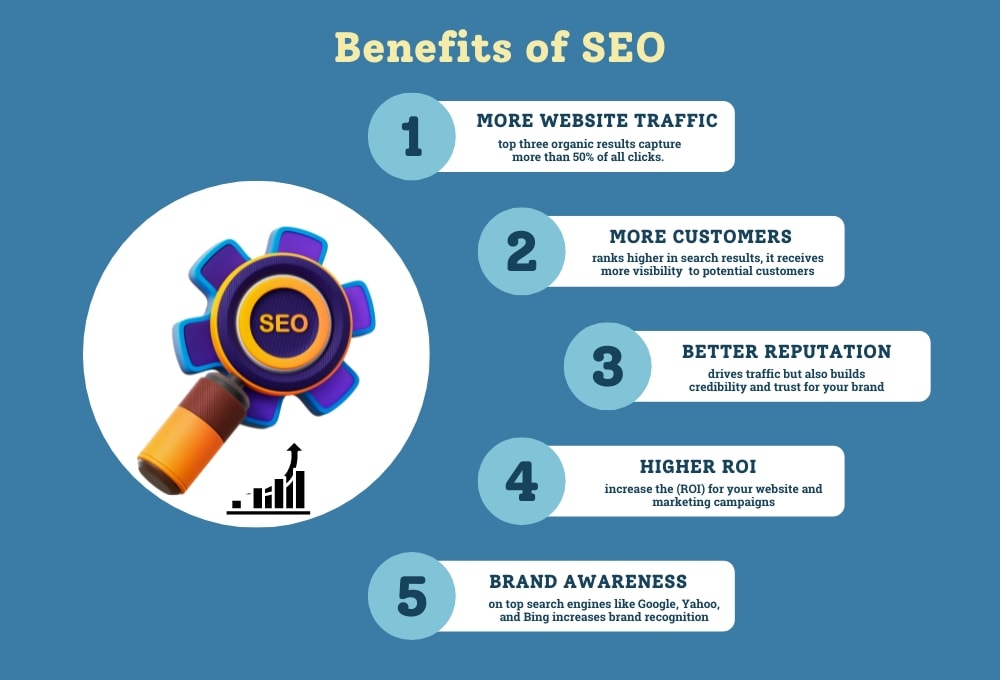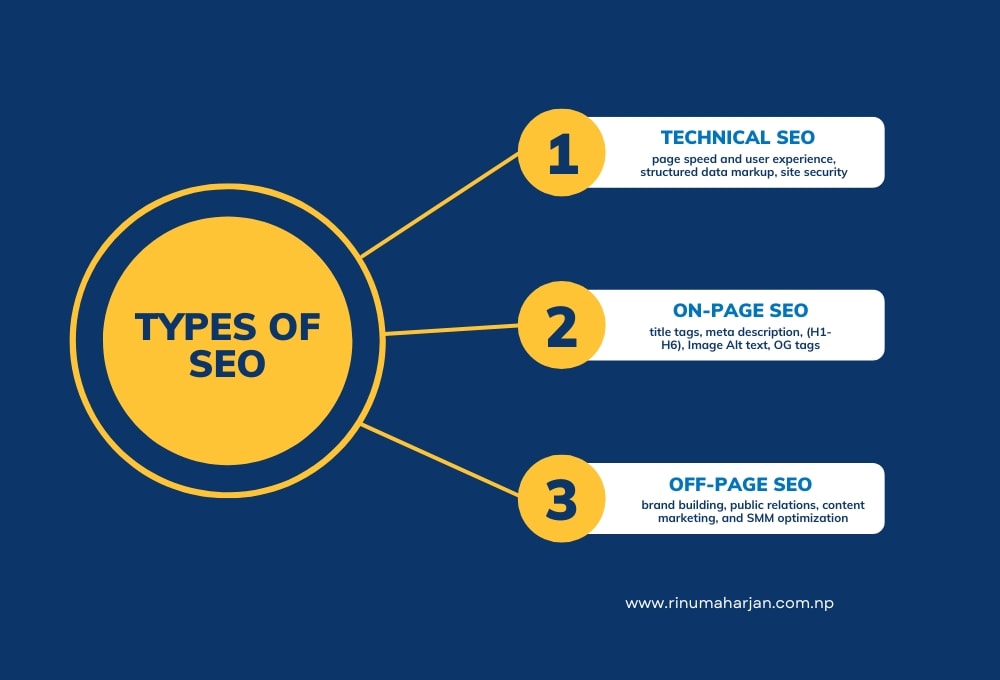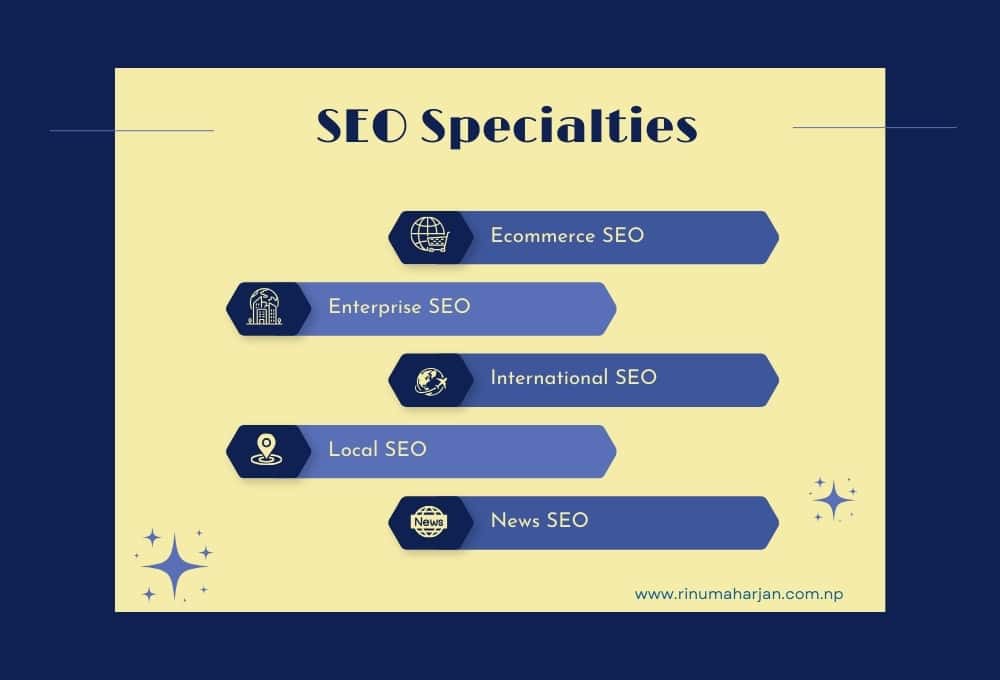SEO stands for search engine optimization that helps your website become more visible when people search for things on Google or other search engines. Imagine you have a treasure map, and SEO is the key that helps you find the treasure. It’s all about making your website easier to find so that more people visit it.
When we talk about SEO, we’re basically trying to make sure that when someone searches for something online, like the products you sell, the services you offer, or even topics you know a lot about, your website shows up at the top of the list. It is important because the higher your website appears in the search results, the more likely people are to click on it.
When more people visit your website, there’s a better chance they might become customers, clients, or just keep coming back for more. So, SEO is like a tool that helps you attract visitors to your website and grow your online presence.
How Search Engine Optimization Works?
SEO, or search engine optimization, is like a guidebook for your website that helps it get noticed in the vast world of the internet. When you search for something on Google, like “what is SEO,” you find pages like this one because they’ve mastered the art of SEO. So, how does it work? Well, let’s break it down.
The Process Behind SEO
Understanding Search Engines: Search engines like Google have a job to do – to find the best answers to your questions. They do it in four steps: crawling (finding web pages), rendering (figuring out how pages look), indexing (analyzing page content), and ranking (deciding which pages are most relevant). Each search engine has its own rules, so optimizing for Google is different from optimizing for YouTube or Facebook.
Researching: Before diving into SEO, you need to understand your audience, the keywords they use, and what your competitors are up to. It involves looking at demographics, finding popular search terms, and analyzing what others in your field are doing.
Planning: Just like any journey, SEO needs a roadmap. You set goals, define key performance indicators (KPIs), decide on tools, and create a budget. The plan guides everything you do in SEO.
Creating and Implementing: With a plan in place, it’s time to take action. This might mean creating new content, tweaking existing pages, or getting rid of outdated stuff that’s dragging you down.
Monitoring and Maintaining: SEO isn’t a set-it-and-forget-it deal. You need to keep an eye on things to make sure nothing goes wrong. That means watching for traffic drops, broken links, or other issues that could hurt your site.
Analyzing and Reporting: Finally, you need to measure your progress. Tools like Google Analytics help you track how well your SEO efforts are paying off. Then, you use that data to make informed decisions about what’s working and what needs tweaking.
Why SEO is Important?
SEO isn’t just another marketing tactic—it’s a major channel that can significantly impact your business’s success. Here’s why SEO matters:

More Website Traffic
Every day, billions of searches are conducted on search engines like Google. Appearing in the top search results for relevant keywords can drive a significant amount of traffic to your website. Research shows that the top organic search result is 10 times more likely to receive a click than a page ranking in position No. 10. Moreover, the top three organic results capture more than 50% of all clicks. By optimizing your website for search engines, you increase your chances of attracting more visitors and expanding your brand’s reach.
More Customers
When your website ranks higher in search results, it receives more visibility and exposure to potential customers. By targeting relevant keywords in your SEO strategy, you attract traffic that is more likely to convert into customers. SEO helps you connect with people who are actively searching for products or services like yours, leading to increased conversions and sales.
Better Reputation
Ranking high in search engine results not only drives traffic but also builds credibility and trust for your brand. When users see your website listed at the top of search results, they perceive your business as authoritative and trustworthy. It boosts your reputation and makes users more likely to engage with your content, products, or services.
Higher ROI
Investing in SEO helps to achieve long-term benefits for your business. SEO provides sustainable results over a time unlike paid advertising where visibility ends once you stop spending money. By improving your website’s ranking positions, you enhance the effectiveness of your marketing efforts and increase the return on investment (ROI) for your website and marketing campaigns.
Search Engine Optimization Types and Specializations
The various types of SEO and their specializations are necessary for implementing a comprehensive search engine optimization strategy. Let’s explore the different types of SEO and their respective focuses:

Technical SEO
Technical SEO involves optimizing the underlying technical aspects of a website to improve its search engine visibility and performance. Key elements of technical SEO include:
Site Architecture: Ensuring that the website is structured in a way that allows search engines to crawl and index its content efficiently.
Page Speed and User Experience (UX): Optimizing page load times and enhancing user experience to improve search rankings.
Structured Data Markup: Implementing structured data markup (schema.org) to help search engines understand the content and context of web pages.
Site Security (SSL Certificates): Securing the website with SSL certificates to provide a safe browsing experience for users and boost search rankings.
On-Page SEO
On-Page SEO focuses on optimizing the content and HTML elements of individual web pages to improve their search engine rankings. Key aspects of on-page SEO include:
Title Tags: Optimizing title tags to accurately reflect the content of the page and include relevant keywords.
Meta Description: Writing compelling meta descriptions that encourage users to click through to the page from search engine results pages (SERPs).
Header Tags (H1-H6): Using header tags to structure the content hierarchy and highlight key sections of the page.
Image ALT Text: Adding descriptive alt text to images to improve accessibility and provide context for search engines.
Open Graph and Twitter Cards Metadata: Optimizing social media metadata to control how web pages are displayed when shared on social platforms.
Off-Page SEO
Off-page SEO involves activities that occur outside of the website itself to improve its search engine rankings and online visibility. Key components of off-site SEO include:
Brand Building and Brand Marketing: Building brand awareness and reputation through marketing campaigns and initiatives.
Public Relations (PR): Earning editorially-given links and mentions from reputable sources to enhance website authority and credibility.
Content Marketing: Creating high-quality content assets to attract backlinks and social shares from other websites and users.
Social Media Marketing and Optimization: Leveraging social media platforms to engage with audiences and promote website content.
Listing Management: Managing and optimizing business listings on directories and review sites to improve local search visibility.
Ratings and Reviews: Monitoring and responding to customer ratings and reviews to enhance brand perception and trustworthiness.
Search Engine Optimization Specialties

In addition to the core types of SEO, there are specialized areas within the field that require unique strategies and tactics. Some common SEO specialties include:
Ecommerce SEO: Optimizing online stores and product pages to improve visibility and drive sales.
Enterprise SEO: Managing large-scale websites with complex structures and multiple stakeholders.
International SEO: Optimizing websites for multiregional or multilingual audiences to expand global reach.
Local SEO: Improving visibility in local search results and Google Maps listings for businesses targeting local customers.
News SEO: Optimizing news content for rapid indexing and visibility in Google News and other news aggregators.How SEO differs from SEM and PPC
Understanding the differences between SEO, SEM, and PPC is essential for navigating the world of digital marketing effectively. While these terms are often used interchangeably, they represent distinct approaches to boosting online visibility and attracting traffic. Let’s understand how SEO sets itself apart from SEM and PPC.
Search Engine Optimization vs SEM
When we talk about search engine marketing (SEM), we’re actually discussing a broader concept that encompasses both SEO and PPC (pay-per-click) activities. So, while SEO focuses on driving organic traffic from search engines, SEM covers both organic and paid efforts to boost visibility and attract visitors.
In simpler terms, think of SEM as a coin with two sides: SEO represents one side, focusing on unpaid strategies, while PPC represents the other side, focusing on paid advertising. Therefore, SEO is just a part of SEM, with the latter incorporating both organic and paid search tactics.
Search Engine Optimization vs PPC
PPC, or pay-per-click, is a form of digital advertising where advertisers pay each time their ad is clicked on. It operates on the principle of bidding on keywords or phrases to have ads displayed in search engine results. In contrast to SEO’s organic approach, PPC provides immediate visibility by placing ads at the top of search results based on bidding and relevance.
So, in the context of search marketing, SEO and PPC represent two complementary yet distinct approaches. SEO aims for organic traffic through optimizing content and website structure, while PPC ensures immediate visibility through paid advertising. It’s not about choosing one over the other but rather leveraging both strategies for a comprehensive search marketing strategy.
Remember, while SEM and PPC are often used interchangeably, SEM encompasses both organic and paid search efforts, whereas PPC specifically refers to paid advertising. Understanding the distinctions between these terms is crucial for crafting an effective search marketing strategy.
How to Learn Search Engine Optimization
As a beginner diving into the world of SEO, learning from experienced professionals like Rinu Maharjan can significantly accelerate your understanding and growth in this field. Our expertise lies in On-page, Off-page, and technical SEO, making them a valuable resource for beginners looking to optimize their online presence. By following my guidance and leveraging the knowledge, beginners can gain insights into the intricacies of SEO, from optimizing website content to building brand visibility and reputation across various digital platforms.
As I emphasize the importance of staying updated with the latest SEO news, research, and best practices, beginners can benefit from subscribing to SEO blogs, following industry experts on social media, and joining relevant online communities or forums. Additionally, investing in attending SEO events and conferences provides valuable opportunities to network with professionals, learn from industry experts, and stay informed about emerging trends and technologies in the field.
You can visit popular SEO sites like Moz, Google’s Developer Guide, Ahref, Semrush, and many more.
Search Engine Optimization FAQs:
What does SEO stand for?
SEO stands for Search Engine Optimization. It refers to the process of optimizing a website to improve its visibility in search engine results pages (SERPs) and drive organic (unpaid) traffic to the site.
How can I start SEO as a beginner?
Starting with SEO as a beginner involves understanding the basics of how search engines work, learning about different optimization techniques, and implementing them on your website. Begin by conducting keyword research to identify relevant terms and phrases for your content, optimizing your website’s on-page elements (such as title tags, meta descriptions, and headings), and creating high-quality, engaging content for your target audience.
How do I optimize my search engine?
To optimize your search engine presence, focus on improving various aspects of your website, including technical elements, on-page content, and off-site factors. It involves tasks such as improving website speed and mobile-friendliness, optimizing meta tags and headings, building quality backlinks from other websites, and regularly updating and promoting your content.
How do I use SEO on my website?
Using SEO on your website involves implementing various strategies and best practices to improve its visibility and ranking in search engine results. It includes conducting keyword research to target relevant search terms, optimizing on-page elements such as titles, headings, and meta descriptions, creating high-quality, informative content, improving website speed and user experience, and building authoritative backlinks from other websites. Additionally, regularly monitoring your website’s performance and making adjustments based on analytics data can help ensure ongoing SEO success.
